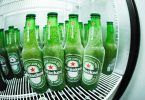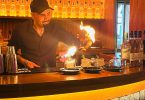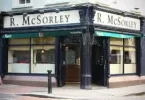LVA conference hears of Dublin trade’s “strong” performance

The LVA’s annual conference focused on ‘Finance’ and ‘the future’
He was speaking at the Licensed Vintners Association’s Annual Conference which took place recently in Dublin’s Westbury Hotel attended by around 180 Dublin publicans.
‘The future of the bar trade’ and ‘Finance’ comprised the two key issues for the conference.
‘Finance’ included contributions on banking issues facing publicans, alternative lending options and pub values.
Prior to the crash AIB’s focus had been asset-based, admitted Brian, but now it’s based on the cashflow that the business can generate.
The publican’s own experience, the pub’s demographic, whether it’s food-led, whether it will need a re-fit in five years or whether it’s a more traditional-type pub able to survive without needing Capital Expenditure – all play a part in lending considerations now.
“We’re considering licensed trade as low risk when it comes to Brexit” he added, “but there remains a question-mark over its wider recessionary impact.”

“We’re considering licensed trade as low risk when it comes to Brexit” – Brian Gallagher.
Getting faster decisions
There’s nothing worse for a prospective borrower than getting a slow ‘No’ from a bank so Brian outlined how to get a faster decision.
“We ask how the pub’s performing and we establish the CapEx requirement for the next few years,” he said.
Amongst the factors that can slow down loan applications:- overly conservative/aggressive projections, not providing the assumptions underpinning projections, not factoring in cashflow items such as tax, CapEx and over-reliance on property value in terms of ability to borrow as well has being vague in terms of what’s being requested.
The Director of Commercial Property Lending with Finance Ireland Niall King also spoke on alternative lending and the Director of Licensed and Leisure with Morrissey’s Lisney Tony Morrissey summed up the outlook for the licensed trade – “positive” as he saw it going forward.
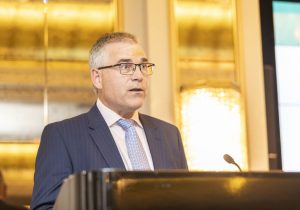
Finance Ireland’s Niall King spoke on alternative lending.
“The institution backs the operator, not the entity”
Tony pointed out that today, “The institution backs the operator, not the entity”.
Licensed premises can be differentiated by “goodwill”, fit-out, licence type and whether or not constructed for a specific use and therefore difficult for any prospective purchaser to convert.
In any asset assessment the business review assess margins, operational overheads, gross/net profit, nature of the business (food, drink, off-licence, entertainment, late night potential, security requirements, any CapEx requirement) going forward as well as the potential for competition in the area. This is reflected in the final valuation.
Compliance with Fire Officers, Planning Officers, Health & Safety Officers etc is also part of the consideration.
Pub sales years
2014 and 2015 witnessed huge volumes of pub sales but some 64% of transactions in 2015 and 2016 were of the insolvency type, Tony pointed out.
This reduced to 42% in 2017 and last year there was just one such sale so that the market has largely returned now to trade/retirement transactions.

“2019 is going to finish up strong and 2020 will be just as good”.
Pub ownership
90% of pubs here are owned by individuals many of whom regard them as pensions. A number of small operators have one, two or possibly three units to their name. Then there are the pub groups such as Louis Fitzgerald, Press Up, Loyola, NolaClan and Body Tonic before sizing-up to the international pub groups such as Wetherspoon and BrewDog.
National outlook
While Brexit posed a certain level of uncertainty, the Western seaboard, the South West and the South East of the country were going to struggle, Tony predicted, adding that the licensed trade in suburban areas of Dublin will become stronger again.
“2019 is going to finish up strong and 2020 will be just as good,” he assured.
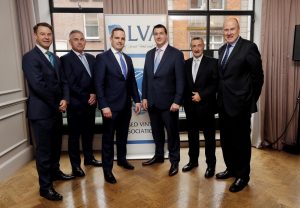
The speakers on Finance (from left): Brian Gallagher, Niall King, LVA Chair Ronan Lynch, LVA Vice Chair Noel Anderson and Tony Morrissey with MC for the afternoon Ivan Yates.
Panel discussion
A top-drawer line-up of publicans joined broadcaster and journalist Ivan Yates during the ‘Publicans’ Panel’ portion of the conference where the future of the on-trade was the topic: how it’s evolving, changing consumer trends and innovations throughout the industry.
The panel included high-profile publicans from New York (Irishman Mark Fox, President & Founder of US-based Fox Lifestyle Hospitality Group), London (Kells native Patrick Dardis, Chief Executive of Young’s Brewery and Pub Group) and Dublin: Matt Ryan (owner of the 47-outlet Press Up Entertainment Group), Shane Treacy (Managing Director of the Mercantile Group) and Alan Clancy (owner of NolaClan which includes 37 Dawson Street and House outlets in Dublin, Belfast and Limerick).
What are customers demanding today?
“We lose sight of what 80% of our business is about at our peril,” warned Patrick Dardis.
Café en Seine, for example, is about an experience and it’s one which consumers can also communicate via social media.
“- But what constitutes ‘an experience’?” pushed MC for the afternoon, Ivan Yates.
“We look to see what they’re doing,” said Patrick, “Who’s the new boy or girl in town and what are they doing?”
Offering an experience meant having all the artisan gins and mixers.
Patrick posed the question, “What’s so special about a G&T?”.
It’s about how it’s presented, he said, “It’s about the overall experience. The product is only part of the story”.
Top-end pubs offering a great product and a changing portfolio are still doing well, he believed.
Mark Fox’s customers want cocktails created in an artisanal way.
“What separates you from the other guy is a well-balanced cocktail,” he said, “It’s the customer journey and for me it’s all about customer recognition.
“It takes three visits before the customer decides to return regularly,” he believes, “There are 24,000 licences in Manhattan and many thousand will go out of business every year, so how’s your staff member approaching your guest?”
Mark Ryan had noticed that Press Up was getting a lot more bookings than ‘walk-ins’.
“We don’t know how much of it is derived from online advice but I reckon it’s huge,” he said.
“You can pull out your mobile and find out what people think is the best place to go.
“For me, the key boxes to tick are service and quality – people want to be given good service and made feel good.”
Patrick Dardis
Kells-born Patrick Dardis worked in bars in London alongside his full-time job with Courage Brewery. He developed his career over 40 years and now heads Youngs, a brewing and pub operation with a market capitalisation of £750 million – a powerful player in the London on-trade. Patrick points out that around 85% of top-end pubs are of the freehold variety “… with 80% of these having a serious food offering”.
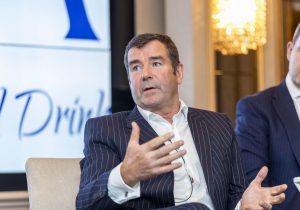
Patrick Dardis – “We’re now spending 90% of our effort on retaining staff when it was once the other way round, recruiting them.”
Importance of the tourist
Youngs tends to focus very much on its core business, even where tourists are present, said Patrick.
“The tourist profile in London is changing dramatically where we’re getting Americans and Asians who’re not good drinkers,” he’d found.
The Fox Hospitality Group’s focus is on corporate clientele not tourists. Monday night’s staff are pitched against each other to sell wine.
Alan Clancy has one bar that would get a lot of tourists so it’s important that he makes them aware of the outlet.
Importance of late-night
Youngs pulled out of the late-night market in London. Patrick feels that the industry must find ways of getting people into outlets from Monday to Thursday instead.
“We’re still seeking that solution,” he added.
The once popular Quiz Night has come around again, he noted, with in-outlet numbers going from 10 to 100 to 150 on these nights.
Fusion of food or separate it out?
Ivan Yates asked the panel whether or not food should be separate from drink in an outlet.
“We have a big mix of food styles to draw in people,” explained Matt Ryan, “There’s no such thing as rent- or rates-free nights on a Monday, Tuesday or Wednesday, so my outlets need to be doing business on those nights.
“There’s no supplier discount on these days either so we need to have food,” he said,
“But food is hard work and to get it right takes huge effort. If you can just serve drink it’s great. But I wouldn’t like to be starting a business now that didn’t have food and think that I could just fall into wet sales.”
Whether or not to mix food clients with drink clients depends on the style of bar – traditional or modern – responded Alan Clancy.
“Pubs down the country, for example, need food to bring in customers. But that’s a difficult one – I’m not sure it’s ever a money-maker Monday to Thursday.”
Matt Ryan
The Co-Founder of the Press Up Entertainment Group seeks “big spenders” for the Group’s outlets around Dublin city. It owns a diverse portfolio so identifying the particular customer target is open to a variety of possibilities but generally it offers a mix of casual alongside premium casual dining.
“Getting them inside the door is one thing” he points out, “but getting them to spend when there is quite another. So many head-off after just the one. We’re looking to try and get an extended spend from them.”
He’s aware that the younger person’s wallet is ‘challenged’ but he reckons that the young professional is nevertheless a good spend prospect ‘though heavily challenged with rent/mortgages etc.
“But they’re keen to get out and eat, drink & socialise where the older clientele are less inclined to drink as much as they used do.”
Like many in the trade he’s seen a curb in volumes but an increase in demand for premium.
“There are so many changes going on, so many aspects to executing a full sale and those expectations are so high.”
Once up-and-running, however, an outlet needs to get some sort of reward, he believes, where something gets a bit easier to derive business from and this comes from a mature spender.
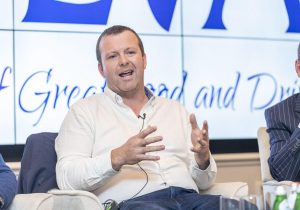
Matt Ryan – “I wouldn’t like to be starting a business now that didn’t have food and think that I could just fall into wet sales.“
Best return on marketing
What made for the best return on marketing, asked Ivan.
“If I’d been asked that question seven years ago it was to throw a huge party and invite everyone,” responded Matt Ryan, “I wouldn’t go near that now. Now it’s organic, solely about our experience. We’ve no discounts or offers and instead gamble on setting an experience for customers.”
Press Up now signals its presence through limited activity on social media with two or three postings a week.
“We’re aware that there could be a turn against mobiles, with people getting sick of constantly bleeping phones” he warned, “so I wouldn’t want us to be reliant solely on this. We prefer word-of-mouth experience.”
And how long to build up loyalty, asked Ivan?
“It takes years and years,” Matt answered, “I’d refer you to the earlier speaker reckoning on three great experiences before a consumer might become a regular.
“It’s not easily achieved. The golden nugget is to have the sort of business that’s so ingrained in the consumer that it’s natural for them to go into town.”
This is the challenge and the reward for being city-centre located.
“Hotels represent around 23% of our business and in three years that will be 67% as they’re a growth channel. We want customers to stay within our building for a 24-hour period,” said Matt, “Occupancy is our key metric there so we have to be city- or near-city-based.”
Nevertheless, he believes that suburban pubs/neighbourhood dining demand is likely to be immense when consumers can walk home after eating and drinking.
For Youngs, the best return on any marketing activity has been the investment in its pre-booking service.
“You can manipulate bookings to fill upstairs rather than downstairs and it has enabled us to prevent everyone turning up at the same time,” said Patrick, “From a marketing perspective it’s about how you get to your customers. Our booking system is integrated.
“An app, for example, allows someone going to the bar to order food and what’s more the staff know you’re coming – we’ve heavily invested in the app which is purely for Youngs pub chain.
“Technology is the new marketing in my view.”
90% of the marketing at the Fox Hospitality Group is “internal”.
Through pre-booking, for example, the Group can track spend on POS and ensure the manger touches the table at least once.
“We’re identifying what customers like to eat for next time” he said, “which is why retail information is kept on the customer.
“The POS system is synched with the Open Table system,” he added.
Social media is hugely important, believes Alan Clancy, because consumers today want to know what’s going on and what’s going on with other people.
“They’re seeing where to go for the weekend and I want to encourage them that what they’re seeing is what they want.
“We use influencers (we don’t pay them) and find people booking on the back of such influencers.”
He also feels that pre-booking services are for after you’ve captured the customer.
At the Mercantile Group Shane Treacy would be planning three to six months in advance.
“We’d identify a few special days such as when big matches are on and we don’t ignore customers on social media but reply to their queries and complaints,” he said.
Mark Fox
Irishman Mark Fox began working in the Old Orchard in Dublin before moving onto the Red Cow Inn and the Playwright. He went to the US in 1999 where he got involved with two others in a pub group. He opened his own pub in Queens in 2001 before opening the Banc café bar and by late 2005 the business was thriving. He opened another outlet in 2007 and another in 2009. In 2012 he formed the Fox Hospitality Group, opening an outlet in Greenwich Village in 2014 after completely gutting and renovating it. By way of decor he installed an Old-School romantic tavern offering 100 whiskies and a whiskey club.
He also opened a health food shop in 2015 and in 2016 opened the 2,000 square foot Street Taco in the Gramercy area of New York.
In 2017 he signed the lease on a unit beside Maceys. The office building was originally a garment factory in the old NY garment district. Mark gutted it, putting back a lot of the factory elements, renaming it The Rag Trader.

Mark Fox – “The idea that we’re interviewing them is a fallacy as they’re interviewing us!”.
Craft beer – plateaued?
Craft beer is in its 15th year of growth in the US and grew 4% last year said Mark Fox.
“While it may be coming to saturation in the marketplace we feel the consumer still has an appetite for it. They want to know about it and so there’s still an opening in the market for craft beer.”
Press Up offered a wide variety of everything before dropping back to a core range.
“Our customers tend to look for mainstream or genuine craft,” commented Matt.
Despite the premiumisation of beer and international brands, despite stout losing out to lager, bottled and draught beers, ciders and Non Alcoholic Beers/Low Alcohol Beers, craft beer still has a “long way to go”, believes Patrick, as it’s challenging traditional tastes.
Gin?
Gin has been an inspiration, enjoying some six years of 30% growth.
“Why? Because the trade has just presented it better and has become better at marketing the product.”
Similarly the presentation of cocktails and even Non Alcoholic cocktails is now much better.
“It’s important to ensure that No/Low Alcohol cocktails look exactly the same as the alcoholic ones,” he said, while not forgetting that a pubs’ core business is pints of beer – “These are still going to be the most important parts of your business”.
Wine?
The only growth in wine in the UK has been in rosés, pointed out Patrick, who believes that spritzers will be the next ‘big thing’.
“One wants a gender balance in the outlet,” he explained, “It’s important to make the presentation of drinks more relevant to today so spritzers are becoming more relevant – I know a pub with 15 different spritzers and its volume sales went up by 25% in the first three months”.
Shane Treacy sees wine as a massive opportunity – particularly in conjunction with food – to up Gross Profit.
“The customer is willing to trade up as they tend to go out less often,” he believes.
Shane Treacy
Outlets in the Mercantile Group include Café en Seine, Whelan’s, The George, NoLita, Mercantile and Opium. The Group’s Managing Director Shane Treacy believes that people want to go home with their expectations met.
“That expectation is driven by what they’ve seen on media and they expect to have good service, good product and to be socialising with like-minded people,” he says, “We need to deliver a good night out consistently.”
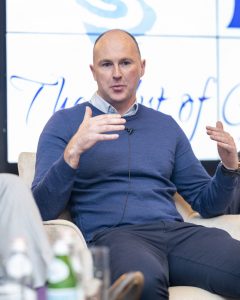
Shane Treacy – “The customer is willing to trade up as they tend to go out less often”
Staffing
“We’re our own worst enemy on this,” observed Patrick, “We’re now spending 90% of our effort on retaining staff when it was once the other way round, recruiting them.”
Staffing issues have got a lot better in the Fox Hospitality Group. The majority of Mark’s workforce is Millennial.
“In five years 80% of the workforce will be Millennial,” he pointed out, “They want work/life balance. It’s not so much about the money, it’s about your product offering – could they feel proud to work for you?
“Our on-the-job training is significant even though we recognise that staff might not want to be here in three to five years,” he commented before adding, “The idea that we’re interviewing them is a fallacy, they’re interviewing us!”.
People still find it very difficult to work in Dublin and not be tempted to work next door.
The Mercantile Group attends the LVA course for staff and is trying to come up with a four-day week roster.
Retaining staff is no easy task therefore.
Matt Ryan feels it important to create opportunities for staff to discuss improvements and growth, a four-day week etc.
“In 2017 we had 13 people coming in and saying they’d been headhunted for more money”.
What about bonuses enquired Ivan.
Matt’s not a fan of bonuses for staff; he’d looked at it “… but it’s really hard to find balance for something that‘s going to drive someone to do something better.
“We’re bursting our backs to create a place you like and for a 40-hour week that’s about as hard as we can compete with other employers.”
Alan Clancy agreed that work/life balance for staff is now becoming NolaClan’s Number One priority.
“The alternative employments out there are good with jobs that give you lots of time off where our staff have to work when their friends are out,” he said, pointing out that efficient rostering should give staff a chance to have a life outside the outlet.
“We’re concentrating on getting the staff that will engage with the customers,” said Alan, “It’s the experience that counts. A bar can be nice, flash and cool, but without that staff interaction you haven’t made it successful.”
Alan Clancy
Alan Clancy, owner of NolaClan, is a publican well-known for stylish outlets. NolaClan’s portfolio includes 37 Dawson Street, House and The Oak on Parliament Street as well as businesses in Belfast and Limerick.
Alan looks for what’s missing when he opens a bar, “What’s the niche and how can I offer a better experience?”.
He opened 37 Dawson Street in 2011; following this experience he found it easier to pick up ideas to make them international yet ‘local’.
He’s also found that over the last six or seven years trends have changed every six months, so following these trends could have you in trouble.
“Customers are not coming out every week as they used to but once or twice a month instead,” he observes, “So you must deliver the experience they expect or you’re failing them.”
Keeping consistency in the current market is a challenge; this is the problem with staff changes.

Alan Clancy – “A bar can be nice, flash and cool, but without that staff interaction you haven’t made it successful.”
Management accounts
As part of his regular management visit Patrick always checks turnover to see why people are not coming to a pub.
Turnover would also be a key metric in Press Up Entertainment.
“We must all work so much harder than 10 years ago,” said Matt, “Other things can be managed, but without turnover…”
The Mercantile Group is all about turnover too because it’s much harder to go out and retrieve lost market share, believes Shane Treacy.
Reducing claims
And one of the biggest draws on profit today has been the compensation culture – of which Press Up’s Dean Hotel is only too keenly aware.
But for the first time Matt’s starting to see cases where claimants don’t get it all their own way.
“Of course there are genuine accidents” he stresses, “but it’s so important that we segregate them out.”
Staff awareness in this area is crucial.
“Within the first 24 hours one must react very quickly,” believes Alan Clancy, “One needs to find out whether we’re at fault or not and engage with the potential claimant – or stay away from them.”
Working with suppliers
Relationships with suppliers can’t be based just on price. For example Youngs is interested in exclusive promotions.
“At Press Up we weigh-up suppliers from an added-value perspective, what they’re willing to do to grow their product in our business,” said Matt, “It’s their channel to market so what innovative and exciting ideas do they have around that product?”
Alan Clancy agreed.
“It’s important that we work together,” he added, “Every company I deal with has a portfolio of ideas and marketing people that can suit my business and enhance it. It’s a very important part of my business.”
In wrapping up the conference LVA Chief Executive Donall O’Keeffe pointed to the resilience of the Dublin trade and finished up with the following observations.
He’s very optimistic about the long-term future of the Dublin pub thanks to the quality of the publican in Dublin who’s continually raising standards and introducing innovations into the trade.
Could Brexit wreck it? Possibly, but the long-term trends around consumption are positive.
“What will take us through is the commitment to what we’re good at,” he told the conference, “Not all of our members will make it and those who don’t are those who don’t evolve, change and compete and those who don’t stay close to their customers.
“It’s not the strongest that survive or the most intelligent, it’s those most responsive to change.
“We will look back in 10 years’ time to say how simple the business was today,” he predicted.

The publicans’ panel (from left): Alan Clancy, Mark Fox, Shane Treacy, Matt Ryan, Patrick Dardis, LVA Chairman Ronan Lynch and Vice Chair Noel Anderson.





